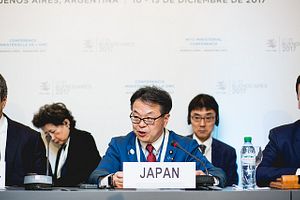On Tuesday, Japanese Minister for Economy, Trade and Industry Seko Hiroshige announced renewed confidence in securing U.S. tariff exemptions for individual Japanese iron and steel items despite measures coming into effect on Friday.
As the United States’s fourth largest trading partner and close ally, Hiroshige said at a press conference “there’s a high possibility” for negotiating tariff exclusions on one-of-a-kind steel and iron products supplied to the United States. He said there was no denying the “usefulness of Japanese products” for American industries in which “no alternatives” can be sourced domestically.
On March 8, U.S President Donald Trump signed an executive order to impose tough import tariffs — 25 percent for steel and 10 percent for aluminum products applied to all trading partners after March 23. Leveling “unjust” trade practices was a key campaign promise Trump made to American steel workers.
Trump has pointed the finger at countries with which the United States has “huge” trade deficits, putting the spotlight on the European Union, Japan, China, Canada and Mexico. He tweeted “we are on the losing trade side of almost all deals and our friends and enemies have taken advantage of the U.S for many years.”
While the U.S has a USD$69 million trade deficit in goods with Japan only 5 percent of Japanese steel and iron are exported to the United States. Japan ranks sixth behind Canada, the EU, South Korea, Mexico and Brazil as a U.S supplier of steel imports. Experts say the impact will be felt immensely by the EU rather than China and Japan, but the Japanese economy and Asian markets could nevertheless be harmed if a global trade war is sparked.
Japan wasted no time lodging a tariff exemption application with the U.S Department of Commerce on March 19, opening day, and an outcome is expected within 90 days. A key component to securing exclusions is not posing a risk to U.S. national security. Hiroshige emphasized Japanese steel and aluminium cause no adverse impacts, instead, “making a great contribution to American industry and employment.”
The extent of steel and aluminum products covered have yet to be clarified and there is no indication of the intended timeline for higher tariffs. Japan’s Ministry of Economy, Trade and Industry along with Japanese companies have been left hanging with no public confirmation after pushing for a complete exemption from U.S. steel and aluminum import duties.
At this stage, Canada and Mexico are temporarily exempt due to a pending trilateral trade agreement and Australia has been handed a golden pass from additional tariffs since the U.S runs a trade surplus in goods with Australia.
At the center of Trump’s argument is the threat to national security that foreign competition poses on domestic steel and aluminum industries that have been hit hard by the “dumping” of cheaper import metal resulting in job layoffs. According to Bloomberg data, in the glory days of the early 1950s, the steel industry employed 650,000 workers but due to the automation of steel mills, global steel jobs drastically dropped and 150,000 steelworkers are employed in the U.S. today.
Tensions internationally have been brewing, adding to concerns of an escalating global trade war. So far, China has promised to take “necessary measures” on U.S agriculture products and the EU has threatened retaliatory tariffs on American-made products to Europe ranging from Harley-Davidson motorcycles to peanut butter.
EU Trade Commissioner Cecilia Malmstrom denounced the tariffs calling them “not the right way” to deal with the global overproduction of steel. Hiroshige said the United States’ decision to impose tariff hikes was “extremely regrettable” and would negatively impact multilateral trading systems as a whole. He said the real issue at hand is addressing distorted aluminium and steel prices.
However, Trump is showing no signs of backing down, provocatively tweeting, “trade wars are good and easy to win.”
In a test of friendship, Japan’s reaction has remained cautious and nonaggressive in a bid to maintain cordial ties with its most important ally. But Japan will reassess its course of action once the outcome on tariff exemptions are determined and the losses Japanese businesses will incur are calculated.

































